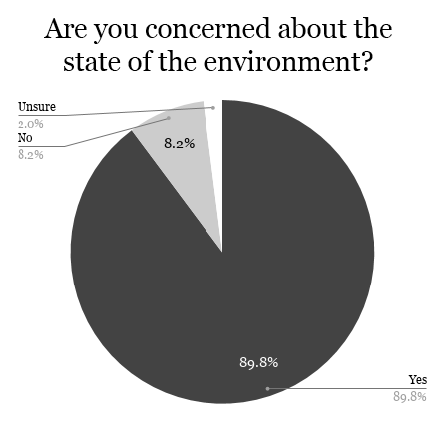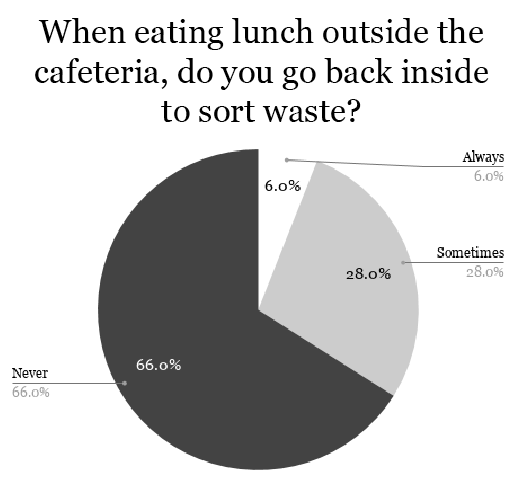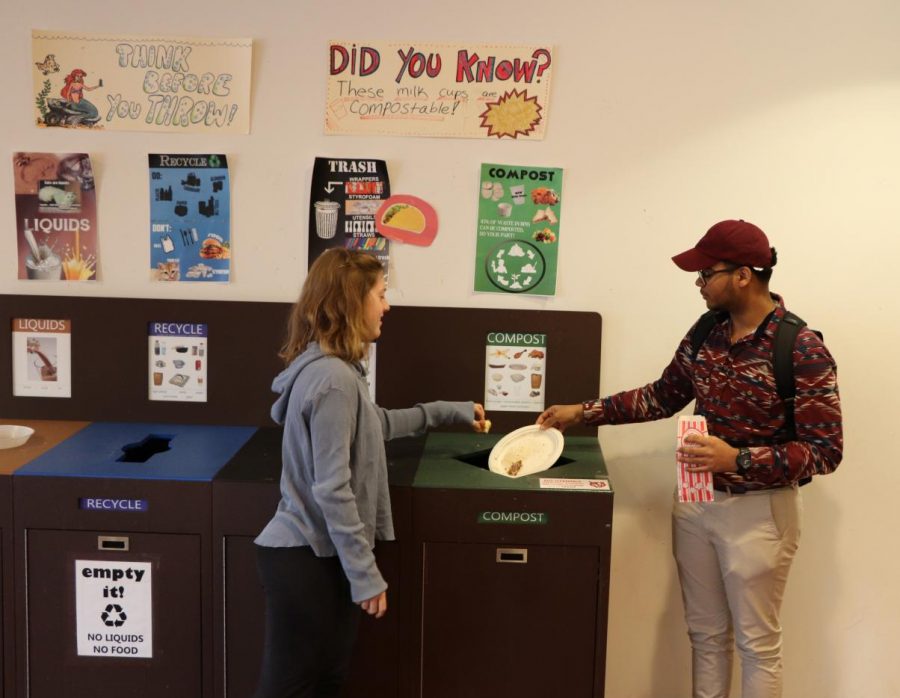Pictured: Students using the compost bin in the Media Caf.
Environmental Sustainability Today
How Can Cambridge Make a Difference?
February 26, 2018
The environment is currently in a state of distress through overpopulation and the exploitation of resources. Therefore, actions working towards environmental sustainability are necessary. Environmental sustainability is the “state in which the demands placed on the environment can be met without reducing its capacity to allow all people to live well, now and in the future,” according to the Financial Times.
Although Cambridge, Massachusetts, is considered to be fairly progressive, questions still arise regarding its environmental sustainability. How environmentally sustainable is Cambridge and its public high school? Do Cambridge Rindge and Latin students tend to care about the environment and practice sustainable habits, in and out of school? What are Cambridge’s current and future environmental goals?
Cities such as Cambridge—which has an estimated population of over 110,000 people—have major impacts on the environment, which cause issues such as air and water pollution and other problems. With many residents expressing concern about the state of the environment, the city has felt pressure to increase environmental sustainability. Cambridge is experimenting with residential composting programs, and CRLS has adopted sustainable practices such as sorting food waste in bins located in the cafeterias.
The Waste Epidemic
Throughout the world, waste is increasing every year along with the rapid increase in the human population of the Earth. According to the United States Environmental Protection Agency, 254 million tons of waste were created in 2013 in the United States, and 14.6% of the waste accounted for was food waste. Out of these 254 million tons of waste, 87 million were either recycled or composted. In 2008 specifically, Americans created 32 million tons of food waste, and less than 3% of this waste was composted, according to the Boston Globe. In a Wicked Local Cambridge article, Randi Mail, the director of recycling in Cambridge, stated that a staggering 40% of food in America is wasted.
For composting to have a drastic impact on the environment, local governments usually have to incentivize it.
Although a sufficient amount of waste in America is reused somehow, waste is still a pervasive issue. Some attribute this massive amount of waste to the “throw away” society that some Americans live in, where material goods are constantly updated, repurchased, and then thrown away again for the endless cycle to repeat. The lack of gratitude that some Americans have for material items is a cause of the millions of tons of waste created each and every year. Although a minimalist lifestyle for Americans could be ideal, recycling and composting contribute to a more environmentally sustainable future.
Background on Recycling and Compost
Recycling is the process of converting materials such as glass, paper, plastic, and metals from trash and transforming them into other useful materials. Recycling is positive for both the environment as well as the economy, by creating “nearly five times as many jobs as sending materials to a landfill,” writes Melanie Nutter in a CNN article. Composting is when food scraps, yard trimmings, and other forms of organic waste are gathered and eventually turned into nutrient-dense fertilizer that will foster the growth of other crops.
While composting has gained more popularity in recent years, it has been practiced throughout history. Composting was first written about 10,000 years ago in Mesopotamia, following the Stone Age. Along with being the first president of the United States, George Washington is also considered to be America’s first composter. Benefits of composting include waste reduction, climate protection, managing pests naturally, the incorporation of healthy farming practices and the decrease in the cost of trash.
Many areas within the United States have developed successful composting programs. For composting to have a drastic impact on the environment, local governments usually have to incentivize it, since individual households composting will not make a major difference. According to a New York Times article written by Al Baker, when practiced in cities, composting can save the city ten to fifteen dollars per ton of waste. This is because cities often sell their compost to companies as fertilizer—therefore, the end product makes up for the overall cost of the process of composting itself.
On the island of Nantucket, composting is mandatory and has had a positive impact on the area, according to Nantucket public works director Jeff Willett in a Boston Globe article. Over the past ten years, the composting program has prevented over 60,000 tons of methane—a greenhouse gas—from entering the atmosphere and perpetuating global warming. Cities such as San Francisco, which has one of the nation’s most outstanding composting programs, use punishments—typically in the form of fines—if residents refuse to compost. San Francisco currently redirects 80% of its waste from ending up in landfills and has high hopes to become zero-waste by 2020, states Nutter.
Mandated composting in cities often raises anxieties about the level of cleanliness. However, according to the Cambridge Department of Public Works, pests are less likely to invade compost bins than they are to breach trash bins, since “locking lids are more secure than trash bins which often are the cause of pests.”

Out of the 50 surveyed CRLS students, 89.8% students said that they were concerned about the state of the environment. 8.2% said that they were not, while 2.0% were unsure.
Despite the fact that composting bins keep out unwanted pests, when composting facilities are not well organized and monitored, many issues arise, such as “potent odors, dust, truck traffic, groundwater contamination, fires caused by spontaneous combustion, and equipment noise,” according to an opinion piece written in Newsday. These disruptions can cause extreme stress to communities. However, through proper management, composting is usually not an issue in these sorts of ways.
Survey Results and Statistics
A Register Forum survey on environmental sustainability was distributed to 50 CRLS students of all grades during community meeting. According to the survey, on average, a CRLS student sorts their waste in the cafeterias three days out of a five-day school week. On a scale from zero (not confident), to five (extremely confident), the same students rated their confidence level with sorting waste in the cafeteria to be a 3.7.
Junior Max Mian believes that confidence with sorting waste in the cafeterias will increase if there is “someone standing next to the trash telling people what to do.” Other respondents recommended educating students on how to sort waste and creating some sort of incentive to get students to sort their waste. Respondents were also asked about whether they recycle and compost at home. Of CRLS students surveyed, 94% said that they recycle at home, and 50% reported composting at home.
Many students at CRLS eat lunch outside during the warm weather or purchase food from surrounding stores such as Darwin’s, Broadway Marketplace, Angelo’s, and Mona Lisa’s.
However, outside CRLS there are few recycling bins, so food cannot be sorted as sustainably as possible. This means that when students go outside to eat lunch, they must come back into the cafeterias to sort their waste. Of the 50 CRLS students surveyed, only 6% reported that they always go back inside the cafeterias to sort their waste. Of those surveyed, 66% said they never go back inside to sort through their waste. One leader of CRLS’ Environmental Action Club (EAC), senior Anna Burke, thinks that placing compost and recycling bins outside of CRLS “sounds like a good option.” Burke continues, saying, “We don’t even have recycling bins outside, so everyone throws everything into the trash … [and] it would definitely increase the amount of compost if we had those bins outside.”
According to Burke, as well as science teacher Ms. Stomberg, there are not more bins outside to sort waste, because even inside the cafeterias, waste is not being sorted properly. In addition, litter is already a large issue outside that is expected to increase with more bins. However, CRLS’ Environmental Action Club is leading the effort to have recycling and composting bins placed around campus outside of the cafeterias.

CRLS students answered whether they “always” (6%), “sometimes” (28%), or “never” (665) go back into the cafeteria to sort their waste after eating outside of the cafeteria.
Burke explains, “First, we have to make sure that everyone is throwing away [their waste], and then … I think we can tackle the issue of sorting it into trash, recycling, and compost.” She continues, explaining the next steps, “Right now, in EAC, we’re working on an initiative and making stickers to try to increase people’s knowledge of compost in the school, so hopefully once we make those and hand those out, then people will understand the importance of picking up their waste and … sorting it, and then we should be able to increase compost.”
Interview with an Expert
Ms. Stomberg teaches AP Environmental Science, is the EAC advisor and CRLS alumna, and is a strong advocate for environmental sustainability. Ms. Stomberg has been interested in nature for as long as she can remember. She studied forestry and environmental studies in college and says, “It just seemed like the only important thing to think about, and I love being outside … and being with other people who do the same.” To help the planet, “We all have to sort of become aware of it collectively in order to have a potential for a good future,” says Ms. Stomberg. She applauds Cambridge for its efforts in reducing waste, saying, “We’re really making strides, unlike many other towns and cities, in terms of composting and recycling.”
However, Ms. Stomberg believes that there are more ways for Cambridge—specifically, CRLS—to be more sustainable: “When [CRLS] was redone, it was redone with some … energy efficiency components, but it could have been done with much more.” Stomberg hopes that CRLS will decrease its paper usage by going more digital, and not just in terms of computers: “Even in the bathrooms … we should have those efficiency dryers,” says Stomberg.
Schools generate a lot of waste due to supplies, food and certain rules and regulations that limit the reuse of items. For example, in New York, public schools have food rules that “ban re-serving unwrapped food once it has been placed on a lunch tray, for fear of contamination,” writes the New York Times. These legitimate cafeteria and food regulations are common throughout the United States, causing food waste to build up rapidly.
Cambridge Rindge and Latin helps to lessen the impact of food waste on the planet by having bins that separate out the different types of waste, in both the main and media cafeterias. There are sections for composting, recycling, liquids, and simply trash. These separate sections for different types of waste attempt to benefit the environment, but some students are not confident in their ability to sort waste—therefore, waste often ends up in the wrong bins, which is detrimental.
Ms. Stomberg agrees that CRLS students’ low confidence in sorting trash is a major issue and thinks that it is caused because composting and recycling is “not part of our culture, necessarily—we have a really big school.” She adds, “It’s really hard to get people on the same page for any sort of issue or mission.”
Ms. Stomberg believes that “regardless if students want to get involved [with environmental science] in their future lives … everybody needs to be informed on these issues.” Students that attend Rindge are encouraged to be educated on the environment. CRLS encourages students to join the Glocal Challenge, where students create solutions to combat environmental issues in relation to Cambridge. The topic of the 2016 Glocal Challenge was to come up with food waste reduction options.
Cambridge’s Hope for the Future
Cambridge is progressing towards a more environmentally sustainable city and has targets to reduce both gas emissions and waste streams by 80% by 2050. To reach these goals, the city began a pilot curbside composting program in North Cambridge the April of 2014, which included the participation of 900 residencies and households. Every week, the compost generated by each household was put in a green bin that was placed on the curb and collected, just as recycling and trash is currently collected.
We have to change our focus to reducing waste, just not having to compost in the first place—although some of it is unavoidable.
The pilot program will end on April 2nd, 2018, when the entire city of Cambridge will be able to engage in curbside composting. However, Cambridge residents living in units over thirteen or more cannot participate, which raises an equity issue. These residents are still encouraged to bring compost to “drop-off compost sites, get a subscription with a private pickup service, or consider composting at home with a backyard bin,” according to “Curbside Compost.”
In addition to the composting program, Ms. Stomberg also thinks that there are ways to be more environmentally sustainable with waste, saying, “We have to change our focus to reducing waste, just not having to compost in the first place—although some of it is unavoidable.” Cambridge also encourages residents to ride bikes and has decreased the usage of plastic as well as paper bags in stores by enforcing a fee on non reusable bags.
Cambridge has made major strides in attempting to become more environmentally sustainable. CRLS has adopted many sustainable practices, such as separating trash, having low-flush toilets to conserve water, and more, which encourages students to develop positive habits.
Ms. Stomberg emphasizes the importance of environmental sustainability, saying, “We do depend on the environment in every way. The economy depends on it. … It’s directly connected to our health and well-being. … So, anything that goes wrong with the environment—in terms of pollution, or loss of resources, or loss of sources—affects us directly and indirectly in [varying] ways.”
This piece also appears in our February print edition.
